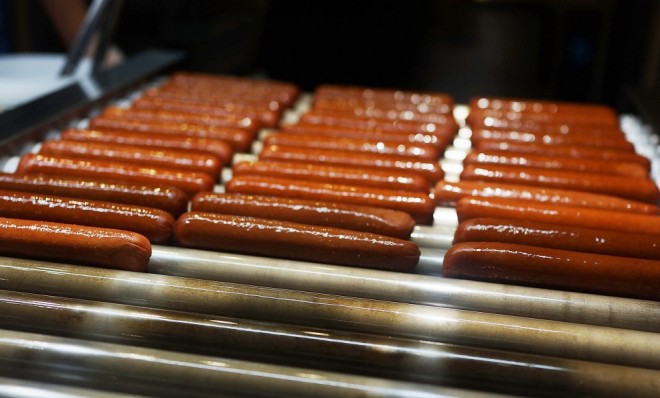From the Odyssey to Kobayashi: A brief history of the hot dog
A mystery meat timeline

A free daily email with the biggest news stories of the day – and the best features from TheWeek.com
You are now subscribed
Your newsletter sign-up was successful
It's hard to overstate how much Americans enjoy their hot dogs. The National Hot Dog & Sausage Council says that last year on July 4, Americans ate 150 million hot dogs — enough to stretch from D.C. to Los Angeles more than five times. Between Memorial Day and Labor Day, we collectively consumed around 8 billion hot dogs.
So where do the meaty treats originate? Many have tried to lay claim to each step of the hot dog's journey, from the creation of the sausage to the idea to put the sausage in a bun to the addition of condiments. Here are some highlights from the delicious journey of one of our favorite snacks:
850 BC
The Week
Escape your echo chamber. Get the facts behind the news, plus analysis from multiple perspectives.

Sign up for The Week's Free Newsletters
From our morning news briefing to a weekly Good News Newsletter, get the best of The Week delivered directly to your inbox.
From our morning news briefing to a weekly Good News Newsletter, get the best of The Week delivered directly to your inbox.
The origin of the Odyssey is its own mystery, but English translations quote Homer as providing one of the first references to sausage. Namely: "As when a man besides a great fire has filled a sausage with fat and blood and turns it this way and that and is very eager to get it quickly roasted. . ."
7th century
A passage from Symeon the Holy Fool translated by Derek Krueger reads:
But he behaved otherwise before the crowd. For sometimes when Sunday came, he took a string of sausages and wore them as a (deacon's) stole. In his left hand he held a pot of mustard, and he dipped (the sausages in the mustard) and ate them from morning on. And he smeared mustard on the mouths of some of those who came to joke with him. Wherefore also a certain rustic, who had leucoma in his two eyes, came to make fun of him. Symeon anointed his eyes with mustard. The man was nearly burned to death, and Symeon said to him, "Go wash, idiot, with vinegar and garlic, and you will be healed immediately."
13th century
A free daily email with the biggest news stories of the day – and the best features from TheWeek.com
In Frankfurt, Germany, pork sausages resembling modern day hot dogs were served at the coronation of Maximilian II, Holy Roman Emperor. Frankfurter refers to the city of Frankfurt, while weiners and hamburgers are named after Vienna and Hamburg.
1870
On Coney Island, a German immigrant named Charles Feltman reportedly sold pies out of a tiny cart. When customers started requesting sandwiches as well, Feltman, too tight on space for big sandwiches, installed a small charcoal stove and a tin box into the cart so he could boil sausages and store rolls, which he would serve together instead of sandwiches.
1880
In St. Louis, another sausage vendor — the wife of German immigrant Antonoine Feuchtwanger — gave customers little white gloves to keep from burning their hands on the hot sausages. When customers started walking off with the gloves, she started serving sausages on rolls instead. Feuchtwanger called them red hots.
1916
Nathan Handwerker, a Polish immigrant and employee of Feltman's, opened a shop on Coney Island where he charged 5 cents a hot dog — undermining his employer who sold them for 10 cents. Handwerker — founder of Nathan's Famous — used a recipe developed by his wife Ida. Reports say he had men in surgeons' aprons eat hot dogs at his stand so people wouldn't worry about the meat quality.
1939
Franklin Delano Roosevelt served hot dogs to the King and Queen of England. The same year, Paul and Betty Pink opened Pink's hot dog joint in Los Angeles, the west coast's answer to Nathan's. The community was still feeling the impact of the Great Depression, so they went to Pink's for Betty's chili dogs, which cost just 10 cents each.
1972
Nathan's held its first annual hot dog eating contest, and to advertise, the event's promoter Mortimer Matz spread a "legend" that in 1916 immigrants held a hot dog eating contest at Nathan's to settle a bet over who was the most patriotic. He later admitted to making it up.
2006
World renowned competitive eater Takeru Kobayashi broke the world record by finishing 53 3/4 hot dogs in 12 minutes at Nathan't Hot Dog Eating Contest.
2007
Joey Chestnut ruined Kobayashi's reign at Nathan's, finishing 66 hot dogs in 12 minutes.
Carmel Lobello is the business editor at TheWeek.com. Previously, she was an editor at DeathandTaxesMag.com.
-
 Local elections 2026: where are they and who is expected to win?
Local elections 2026: where are they and who is expected to win?The Explainer Labour is braced for heavy losses and U-turn on postponing some council elections hasn’t helped the party’s prospects
-
 6 of the world’s most accessible destinations
6 of the world’s most accessible destinationsThe Week Recommends Experience all of Berlin, Singapore and Sydney
-
 How the FCC’s ‘equal time’ rule works
How the FCC’s ‘equal time’ rule worksIn the Spotlight The law is at the heart of the Colbert-CBS conflict